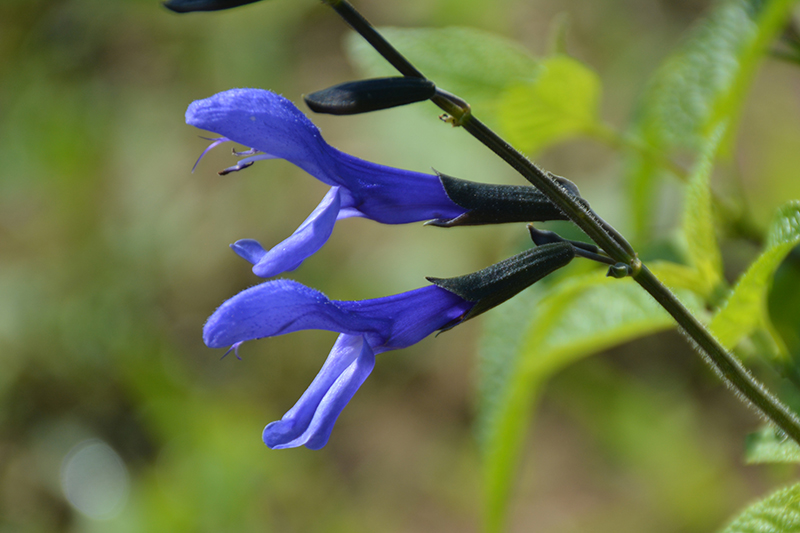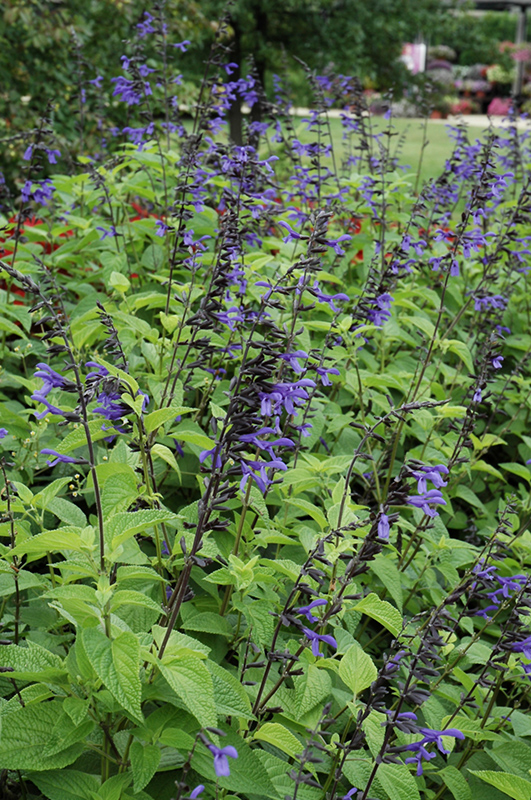Plant Finder
Black & Bloom Sage
Salvia guaranitica 'Black & Bloom'
Plant Height: 3 feet
Flower Height: 5 feet
Spacing: 24 inches
Sunlight:
![]()
![]()
Hardiness Zone: 7
Other Names: Blue Anise Sage, Anise-scented Sage
Brand: Ball
Description:
Striking blue flowers with black calyces emerge on tall, dark purple spikes from mid-summer until frost; fast growing and vigorous; prefers well drained garden soils; great for containers and rock gardens
Ornamental Features
Black & Bloom Sage features showy spikes of blue flowers with black calyces rising above the foliage from mid summer to mid fall. Its fragrant pointy leaves emerge chartreuse in spring, turning green in color throughout the season. The deep purple stems are very colorful and add to the overall interest of the plant.
Landscape Attributes
Black & Bloom Sage is an herbaceous perennial with an upright spreading habit of growth. Its medium texture blends into the garden, but can always be balanced by a couple of finer or coarser plants for an effective composition.
This plant will require occasional maintenance and upkeep, and is best cleaned up in early spring before it resumes active growth for the season. It is a good choice for attracting bees, butterflies and hummingbirds to your yard, but is not particularly attractive to deer who tend to leave it alone in favor of tastier treats. It has no significant negative characteristics.
Black & Bloom Sage is recommended for the following landscape applications;
- Mass Planting
- Rock/Alpine Gardens
- Border Edging
- General Garden Use
- Container Planting
Planting & Growing
Black & Bloom Sage will grow to be about 3 feet tall at maturity extending to 5 feet tall with the flowers, with a spread of 3 feet. When grown in masses or used as a bedding plant, individual plants should be spaced approximately 24 inches apart. It grows at a fast rate, and under ideal conditions can be expected to live for approximately 5 years. As an herbaceous perennial, this plant will usually die back to the crown each winter, and will regrow from the base each spring. Be careful not to disturb the crown in late winter when it may not be readily seen!
This plant does best in full sun to partial shade. It does best in average to evenly moist conditions, but will not tolerate standing water. This plant does not require much in the way of fertilizing once established. It is not particular as to soil type or pH. It is somewhat tolerant of urban pollution, and will benefit from being planted in a relatively sheltered location. Consider applying a thick mulch around the root zone in winter to protect it in exposed locations or colder microclimates. This is a selected variety of a species not originally from North America.
Black & Bloom Sage is a fine choice for the garden, but it is also a good selection for planting in outdoor pots and containers. With its upright habit of growth, it is best suited for use as a 'thriller' in the 'spiller-thriller-filler' container combination; plant it near the center of the pot, surrounded by smaller plants and those that spill over the edges. It is even sizeable enough that it can be grown alone in a suitable container. Note that when growing plants in outdoor containers and baskets, they may require more frequent waterings than they would in the yard or garden. Be aware that in our climate, most plants cannot be expected to survive the winter if left in containers outdoors, and this plant is no exception. Contact our experts for more information on how to protect it over the winter months.

